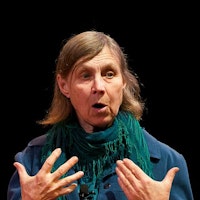This confusion between small self and larger Self is the core illusion of the human condition, and penetrating this illusion is what awakening is all about.
Cynthia Bourgeault

Larger Self
Topic: Self-Cultivation & Health
The person I normally take myself to be—that busy, anxious little ‘I’ so preoccupied with its goals, fears, desires, and issues—is never even remotely the whole of who I am, and to seek the fulfillment of my life at this level means to miss out on the bigger life. This is why, according to his teaching, the one who tries to keep his ‘life’ (i.e., the small one) will lose it, and the one who is willing to lose it will find the real thing. Beneath the surface there is a deeper and vastly more authentic Self, but its presence is usually veiled by the clamor of the smaller ‘I’ with its insatiable needs and demands.
This confusion between small self and larger Self (variously known in the traditions as ‘True Self,’ ‘Essential Self,’ or ‘Real I’) is the core illusion of the human condition, and penetrating this illusion is what awakening is all about.
Cynthia Bourgeault (born March 13, 1947, in West Chester, Pennsylvania, United States) is an Episcopal priest, modern-day mystic, teacher of Christian contemplation, and author. She studied medieval studies at the University of Pennsylvania and Ohio State University, focusing on early music and liturgical drama. Her early experiences of silence at a Quaker school influenced her lifelong interest in contemplative spirituality. Ordained in the Episcopal Church in 1979, she combined her Christian vocation with a deep openness to other traditions, studying Sufism, Tibetan Buddhism, and G. I. Gurdjieff’s Fourth Way.
Her contemplative path deepened in 1990 at a Centering Prayer retreat with Thomas Keating, after which she became his student, editor, and colleague for nearly thirty years. She was also shaped by the guidance of hermit monk Raphael Robin and Benedictine writer Bruno Barnhart. From these roots she helped form communities dedicated to Wisdom Christianity, co-founding The Contemplative Society in British Columbia and serving as founding director of the Aspen Wisdom School. She is also a member of the Global Peace Initiative for Women’s Contemplative Council, where she supports interspiritual dialogue and peace work.
Cynthia Bourgeault divides her time between a hermitage on a small island off the coast of Maine and her global teaching commitments. She is core faculty emerita at the Center for Action and Contemplation and continues to guide the Wisdom Waypoints network. Her books, including The Wisdom Jesus, Mystical Hope, and The Heart of Centering Prayer, explore how immanence and transcendence meet in daily life. In 2021, Watkins Review named her among the 100 most spiritually influential living people. She remains dedicated to what she calls “the path of Wisdom,” a way of living that unites contemplative practice, interspiritual learning, and embodied presence.
Bourgeault, Cynthia. Centering Prayer and Inner Awakening. Cowley Publications, 2004, p. 10.

Cynthia Bourgeault
Theme: Being in Self

About This Cynthia Bourgeault Quotation [Commentary]
Cynthia Bourgeault teaches that the “confusion between small self and larger Self” is “the core illusion of the human condition.” She begins by describing the “busy, anxious little ‘I’ so preoccupied with its goals, fears, desires, and issues.” This surface identity is the one we normally take ourselves to be, yet it is “never even remotely the whole of who I am.” When we seek the “fulfillment of my life at this level,” she explains, “we miss out on the bigger life.” The small self is not denied or rejected, but it cannot reveal the fullness of being. Through silence and prayer, the attention that clings to this smaller identity begins to soften, allowing awareness to turn toward the deeper life within.
Beneath the noise and demands of the small “I,” Cynthia Bourgeault says, “there is a deeper and vastly more authentic Self.” This “True Self,” or “Real I,” is not a future attainment but the hidden reality already present beneath our ordinary awareness. The smaller self, with “its insatiable needs and demands,” continually veils that deeper presence. In contemplative stillness, the mind’s activity subsides, and the heart begins to sense that its life does not depend on control or possession. The teaching of Jesus she cites—“the one who tries to keep his life will lose it, and the one who is willing to lose it will find the real thing”—expresses the same inner movement from grasping to surrender.
For Cynthia Bourgeault, “awakening” means “penetrating this illusion” of separation. The task is not to improve or strengthen the small self but to “lose” its claims so that the larger Self can come forward. This is the shift from living as the anxious, defended “I” to living from the greater field of awareness that is already whole. The practice of centering prayer, grounded in surrender and silence, helps reveal that “beneath the surface” our being is continuous with divine life. In learning to rest in that reality, we begin to live not from striving but from the stillness and freedom of the Self that simply is.
Additional Cynthia Bourgeault Quotations
Related Quotes
Copyright © 2017 – 2026 LuminaryQuotes.com About Us